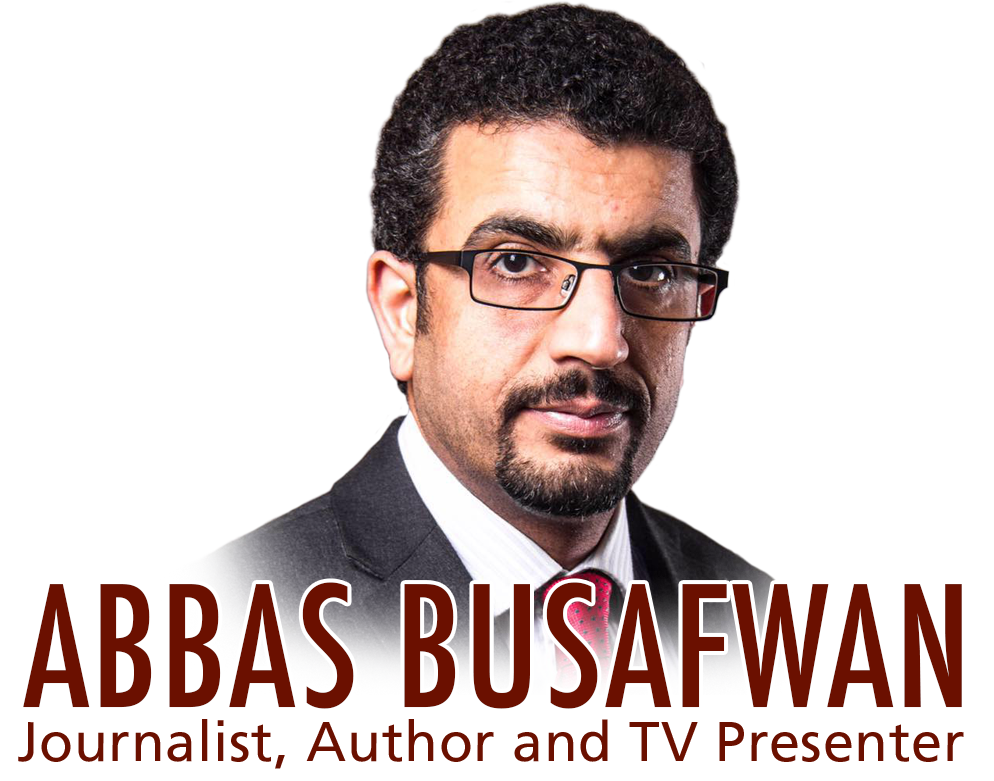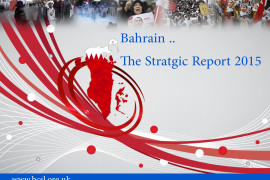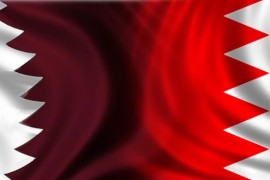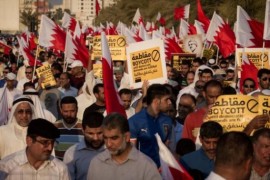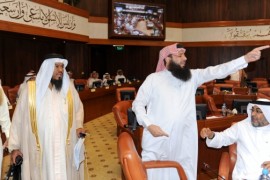- Sunnis loyalists in Bahrain: A Contingently Project for the Bleeding Opposition
- Al-Khalifa: The Mentality of Invasion / “Conquest”
- Sunnis: Loyalty to Al-Khalifa based on Interests… Not a pure loyalty
- Sunnis: A Contingently Project for the Bleeding Opposition
- Renewance of the Sunni concern and waving to break the sticks of obedience
- Beyond the Sunni coldness toward reform
 The Sunni citizens, politically, in Bahrain, are generally classified as loyalists to Al-Khalifa ruling family, and their supporters. This dependency has emerged vividly, perhaps surprising to many, during the stormy crisis that entered the country in the context of the Arab spring, since 14 February 2011. This is in fact a continuation of an unstable political life that almost existed since Al-Khalifa tightened their grip on the small islands of Bahrain at the end of the eighteenth century.
The Sunni citizens, politically, in Bahrain, are generally classified as loyalists to Al-Khalifa ruling family, and their supporters. This dependency has emerged vividly, perhaps surprising to many, during the stormy crisis that entered the country in the context of the Arab spring, since 14 February 2011. This is in fact a continuation of an unstable political life that almost existed since Al-Khalifa tightened their grip on the small islands of Bahrain at the end of the eighteenth century.
For the sake of anachronism, it may be a clear expression for the sage of decadence the Gulf and the Arabian Peninsula was experiencing, the capture of Bahrain by Al-Khalifa happened in the same period the French Revolution succeeded and France transformed into a Democratic Republic after the absolute monarchy.
Al-Khalifa: The Mentality of Invasion / “Conquest”
The official history of Al-Khalifa tribe, the general curriculum and the official media in Bahrain still prefer to use the term “Conquest” to name the successful violent military operation that Ahmed bin Mohammed Al-Khalifa (died 1794) led in 1783 to capture the islands of Bahrain, starting from his ruling headquarter in Zubarah, located on the north shore of the peninsula of Qatar.
Al-Khalifa works hard to enshrine the term “conquest” and strengthen its presence in the overall framework, therefore they gave the title “Conqueror” to the first Khalifi Governor of the island who entered forcibly (Ahmed bin Mohammed Al-Khalifa), and named streets, mosques and public places with this name.
The ruling family believes that the term “conquest” gives them the right to own the land and everything on it, (just like that). In an arbitrary and wrong understanding, they attempt to similarly compare the Al-Khalifa invasion of Bahrain, to the Islamic conquests during the times of Rashedis. However, the recorded agreed on history points that Bahrain Islands accepted Islam peacefully without force, since the era of Prophet Muhammad (PBUH), and has not been known as a Kaafir (Infidels) State in the 18th century, when occupied by Al-Khalifa, unless it was intended that Shiite Muslims, who make up the majority of the population, are infidels, which is not approved by all. In fact, Shiite are Muslims, and it is not allowed to shed their blood, dishonor them and own their properties!
And the term “conquest” feeds resentment and anger and rejection to the majority Shiite Arabs citizens (Al-Baharna), who make up a majority of Bahrain’s population historically. Apparently, removing the label of conqueror/conquest of the mainstream culture is a necessity, so Al-Khalifa forget that they are occupiers of the land, and so Shiites forget too that Al-Khalifa entered the country by force as occupiers.
From the mentality of “conquest”, the official statistics indicate that about 90% of the lands in Bahrain and its Islands (34 Island) are private property, to members of Al-Khalifa. Also members of the ruling family have monopolised most beaches of the mother island Bahrain, and what is called public beaches make up about 5%, according to official statistics. More importantly, the ruling family monopolies the political decision and national revolutions in Bahrain.
Sunnis: Loyalty to Al-Khalifa based on Interests… Not a pure loyalty
Generally, Sunni groups chose the approach of loyalty to the system since the dissolution of the Parliament in 1975 until this day. Some believe that this is due to the non-politicization that Sunnis and their religious and social facades experienced during the security period of the State (1987, 2001), a period which forming associations/political parties was not permitted.
Many believe that loyal Sunnis came on the line of policy only after authorities acknowledged political activities, right after the vote on the National Action Charter in 2001. So this is the big difference between them and Shiite opposition groups, who monopolized the civil space during the security period of the state, and perhaps still in several ways.
Part of that may be true, especially that the backbone of the opposition to the system, in the last 40 years, were Shiites and Sunni activists, however, fueled almost exclusively by Shiite population, from one side because they represent the majority of the population in Bahrain, and from another side because they are affected more than others from the clear discrimination operations and the monopoly of power and wealth, which have increased in the last decade of the ruling of Al-Khalifa, with the leadership of King Hamad and his crew of Khawalids.
This resulted in the Shiite citizens being more aware of problems of the country, and more visible in the streets, and the institutions of civil society, international organizations and international media.
Building on that, saying that the Sunni elite were unaware of why they chose loyalty to the system, needs to be reviewed and reconsidered. And I say the opposite of what the majority of followers think. That is the Sunni elite chose non-politicization, because they found the interest for them and their audiences, one time to avoid conflict with the regime, and one time to get lost among the majority Shiite’s anger and a bloody tribe on the other side, and another time for the (Sunni elites) to get the most gain while the majority of the people are in disagreement with their political system.
In other words, the option of “distance from politics”, during the dissolution of Parliament and the suspension of the Constitution in the last quarter of the last century, was practiced often consciously by the Sunni elite, whether that Arabic elite that represents minority of the Sunnis, or the elite of the Howalas who are Sunnis from Iranian origin, who make up the majority of the Sunnis in Bahrain, who were and still are the body of Ministers and senior officials in government departments and major companies, and financial institutions. This is being practiced since 1970s with a degree of discrimination than exponentially exceeds any other discrimination practiced in the government institutions, and may not match the discrimination in banks and financial institutions, controlled by the Bahrain Houli race (Iranian origin), but that the discrimination practiced by King Hamad since the mid-1960s until now, by building the Bahraini army “fully clean” of any Shiite presence.
The expedient, and opportunistic dimension if you like, is very clear in the Sunni alliance with Al-Khalifa. Therefore considering the Sunnis as backers and pursuant to the authority, does not let us assume that their interests are eliminated. It identifies their objectives, draws their options and positioning after all.
The Sunni elite option to line up with Al-Khalifa was not necessary because of the lack of awareness, as the opposition audience and Shiites generally believe. I tend to believe that it has been this way with conscious aware of interests, even if their enemies call those interests narrow and selfish. Because of this perception and comprehension, the Sunni elite have invested much effort in the Shiite – Al Khalifi dispute, and worked to strengthen the disparate parties concerns: between Shiites and Al-Khalifa, on the one hand, and Shiite and Sunni, on the second hand, and Shiites and the region on the third. This has yielded a solid alliance between Al-Khalifa and Sunni elite and would have its clear impact on nature of governance in any stage.
Perhaps the Sunni elite position and behind that, their obedient audience, resembles the position of number of minorities in the Arabic States, such as Kuwait, where Shiites ally with the ruling Al-Sabah family, and like Christian Coalition of Syria with the Al Asad Alawis, without considering a base, necessarily, we can generalize the same principle on various minorities in the Arab world, those minorities suffering injustice to varying degrees such as blacks in Gulf, Berbers in Morocco and Christians in Sudan, Copts in Egypt, and the Kurds in Saddam Hussein’s Iraq.
Although the Shiite are the majority in Bahrain, they are treated as a minority in a tribal and Sunni sea in the Gulf.
Sunnis: A Contingently Project for the Bleeding Opposition
In February 2011, and after about a week of opposition being massed in Pearl roundabout (15 February 16 March 2011), Sunni loyal associations chose to rally in “Al Fatih” Mosque: the official main mosque in the heart of Manama, and opted for the same name: Gathering / Coalition / people of “the Conqueror (Al Fatih)”, as a response to the name: revolution / people of the “Pearl”, to express how Sunni loyals are connected to the ruling family and in their support, refusing the demand of an elected Government, the Shiite opposition groups call upon.
It is not incorrect to say that Sunni powers, generally, sometimes looked tougher than the ruling family in dealing with the uprising of February 14, for rejecting opposition demands, or whether it is to promote the security solution, and punishment of protesters, incitement, and sometimes “dancing” on their wounds. Perhaps the Sunni elite exercised what is considered a libertinism in enmity, attended by various political and religious leaders, almost without exception.
It has been painful, better terrifying, a lot, to the Shia citizens, many of whom can’t believe, especially liberal Shiite non-opposition elite who are usually loyal to the system, and have intermixed relatively more with loyal Sunnis, after the violent response shown by the Sunni body against the demands of democratization. Sunnis emerged as a solid block fully excited and deaf to live the bad reality, and reject the demands of the Shiite bloc, the other deaf, united around the demand of equality, which varies with the size of the desired partnership in power.
As a researcher and a close follower, I think that Sunni groups, generally, are almost a loyalty movement without any political taste that sets them apart from the political position of the Royal family over the past 40 years. They probably are a ready project for the political opposition, and possibly the violent opposition if it was destined and Bahrain moved to a democratic form, ruled by Shiite political majority, either by turning to a Republican system, a pot of gold at the end of the rainbow, or a constitutional monarch that produces an elected Government, which is still in dispute nationally, or through the alliance of Al-Khalifa with the Shiites rather than the Sunnis, which seems far probably within the corridors of power, that continues to consider Shiites as a strategic threat to the system, a premise believed by King Hamad, proved and confirmed by the uprising of Feburary 14.
And maybe the readiness of the Sunni elite will be cleared to shift towards the opposition, if found necessary to them, through a cold welcome to the steps taken by King Hamad in the beginning of his legitimate political debut in 2001. At that time this elite was very concerned about what is said to be the beginning of an alliance between the new energetic prince with reformist visions, and Shiite opposition leaders who excessively supported Sheikh Hamad, and a dream alliance between these historic adversaries: The Shiites and Al-Khalifa.
The Sunni Elite Loyals were not part of the National Action Charter support project (2001), which was practically a project between the King and the Shiite opposition, proposed by King to come out of the prolonged bottleneck, and after the uprising that began in 1995 and continued until King Hamad took power in 1999. The Sunni elite felt relief in 2002 when King Hamad issued the Constitution of the Kingdom of Bahrain unilaterally and without consensus and national dialogue, which restored the image of alliances to what it was prior to the vote on the Charter: An opposition with Shiite majority against the Constitution, and loyal Sunni majority supporting the Constitution and the authority steps.
Renewance of the Sunni concern and waving to break the sticks of obedience
Now, it is possible to note the readiness of Sunni loyalists in Bahrain to play the role of oppositions to the regime in many parts. One of its manifestations may be the cooler welcoming, and the concern from appointment of Crown Prince Salman bin Hamad Al-Khalifa as First Deputy Prime Minister, knowing that Shaikh Salman in theory and constitutionally is ready, at any moment to hold the reins of the regime.
The Crown Prince in the West and among the opposition groups is looked at as a moderate figure. That is why the Shia “Al Wefaq”, the main Shiite opposition group, welcomed his appointment with delight after several hours from King Hamad order to that decision in 11 March 2013.
In return, you will not find on the same day, and in newspapers the following day, any statements attributed to Sunni loyal groups, welcoming the appointment of the Crown Prince in such a high executive position. This applies to the Al-Menbar Islamic Society, the window in the formal decision-making, which represents the Muslim Brotherhood (Ekhwan Al Muslimeen) line in Bahrain, which its former Chairman Dr. Salah Ali was appointed as a Minister for human rights in April 2012, in an attempt to reassert the Society which represents the Sunni citizens of Iranian origin, who are called “Al Howala” in Bahrain.
And according to Bandar’s famous report, the Al-Menbar Islamic Society members are the main arms to apply the plan of weakening the Shiite role (= the oppositors by official classification) in Bahrain, through a network of secret government, led by the current Royal Court Minister Ahmed Attia, assisted by active figures or subservient to Al-Menbar Islamic Society.
Former adviser on Strategic Affairs in Bahrain’s Royal Court Dr. Salah al-Bandar believes that ethnic groups represented in the Al-Menbar Islamic Society, and its financial institutions and media are the ones who feed, more than others, the Shiite – Al-Khalifa dispute, and make a living of. They (the elite of Al-Menbar Islamic Society) continue to believe that a Shiite – Al-Khalifa convergence should not happen because it harms their interests, which is now a lot of other Sunni groups believe in.
The negative attitude toward the new position of the Crown Prince also applies to the Salafi ASALA group which did not issue a welcoming statement. The former president of Asala Ghanem Al-buainain was appointed, originality in April 2012, as the Minister Foreign Affairs, in an attempt to contain the Sunni elite fears that concessions to the opposition are not behind their backs.
Also The Gathering of National Unity did not issue a statement welcoming the new appointment of Crown Prince, although it issues statements in cases of lesser importance. The gathering of the Sunni loyalists in the Fatih Mosque, on Feb. 21, 2011, was in response to the oppositions gathering, mostly Shiites, in pearl roundabout on 15 February 2011. This gathering at the beginning of it inclluded most loyal Sunni symbols, headed by well-known Sunni personality, and former opposition Dr. Abdul Latif Al Mahmood, which gave the impression that the reform process is not agreed upon nationally and rebellious Sunnis may be on their way to come out.
However, it seems that parties in power pressed for the registration of the Gathering in the Act of political Assembly, in order to achieve several objectives: absorbing the traditional Sunni loyal groups concern toward the regime, such as Al-Menbar Islamic Society (Muslim Brotherhood), Asalah (Al Salaf), who felt that the new structure (Gathering of National Unity) is coming to take their national position, and in front of the authorities.
The other thing, and most importantly, making multi-polar Sunni groups, enabling easier management of loyalists, as it was being done before February 2011. This has been done already, and National Unity is almost shrinking down to one percent compared to the huge number at the time it arose.
Perhaps the most important achievement of the authority following the bend of the “Al Fatih” Gathering to the new law on associations, was ending the hope to emerge the power as a national Sunni current only, rather than forming a narrow political association with political and election goals, and that led to frustration of unity opportunities among Sunni powers and achievement of the goal of those “rebellious Sunnis coming out of the bottle”, as the rebellious remained within the bottle of authority. As the leader of the rebellious Dr. Abdul Latif Al Mahmood remained and roped by authorities, which is hard to escape from, specially after (Mahmood) supported the violent official security steps, which were rejected worldwide, and carried on the rejection of the opposition demands more than the ambitions of authorities themselves. He chained himself with iron chains that are hard to escape from.
It certainly the best of Al-Khalifa successes, who face a deaf Shiite bloc, and do not want to repeat it with the Sunni side. It is right to say that they played this time very eloquently on the Sunni fear Shia game, and scored amazing points to their interest, made loyal Sunnis volunteer to practice violence against opponents.
Perhaps interesting to note that much of what was in the period following the outbreak of protests in February 2011, including increased sectarian nationalism, choosing Dr. Mahmoud as a loyalist leader, was part of what was document in the Bandar report.
Beyond the Sunni coldness toward reform
It would be interesting to know the legislative institution has not made a welcoming statement for the appointment of the Crown Prince on his new post. the loyal groups control the authority of Parliament, which the opposition resigned from in February 2011, making a protest against the official violence against peaceful protesters demanding democracy.
Bahrain TV broadcasted on Thursday, 14 March 2013 a video of well-wishers for the Crown Prince, 16 minutes long, and the shot angles were chosen carefully but did not succeed in showing the size of popular political support for the Crown Prince, and if not finding the faces of the opposition between public well-wishers in this push and pull in expected, but the Sunni leaders not being present confirms the hypothesis of the dissatisfaction of the Sunni groups of reform policies, pursued by the Crown Prince.
The biggest outlet by loyal parties on the Crown Prince is due to the picture formed by local and international media of Shaikh Salman during the mass protests at Pearl. At that time the King’s eldest son was highlighted as a moderate figure, who encourages demonstrations at Pearl Square, welcomes and is ready to dialogue with the opposition, and even go with it in a form that may cause a transformation in Government balances as in his seven-point initiative, which was ruined by the Saudi intervention. It ensured important elements of the foundations of constitutional monarchies, which is rejected by loyal groups that are still De Facto.
For the one who knows the game in Bahrain, the overall positions espoused by the Pro Associations are usually formulated by Royal Minister Khalid Bin Ahmed Al-Khalifa, the strong man in the regime, who is not comfortable with the limited role played by Crown Prince in public policy, meaning that it seems very difficult to consider the stands of loyalists seperate from the stands of characters in the palace, enhancing the premise of the conflict between the power wings on the ways to get out of the crisis.
The Alliance of Al-Khalifa with the Sunni elite is not forever. In politics there are no relations, but permanent interests. However, the two parties and even if they differed in some stations and borders and areas of influence, they have shown a great deal of understanding in what they must do to maintain the status quo, with the limits of the game allowed the parties to push Shiite oppositions in the corner sometimes not free of solitude.
Sunnis in Bahrain are only human beings who prefer to preserve their gains which they consider as “historical”. They are used to enjoy to be first class citizens, and they are going to give that up so easily. They’re like Alawis in Syria, a minority controller, or part thereof, or live on the boundaries.
As in what distinguishes the Sunnis from Shiites in Bahrain, the Crown Prince makes it short and says: “it is true that the majority are Shiite, but Sunnis have weapon”, according to Wikileaks, so a Bahraini Zarqawi could be expected to emerge in the next day to form a Government of Shiite influence, with the Shiite majority in the country, and their partnership in power is a fundamental right.
The fact that should be declared, Bahrain is at a serious crossroads: Options of the ruling family are difficult, and perhaps it is no exaggeration to say that they are in a state of loss and paralysis. For the Shiites, after the terrible oppression practised against them, and their long historic grievance in Bahrain, many sectors of them have raised the banner “either victory or martyrdom.” As the Sunnis show serious concerns from the word reform and compromise that are afraid to be on their account, they are alert and worried about the possible changes, to the point that they no longer left their finger over the trigger of their weapons.
The crisis in Bahrain is not solved through monopoly whatever its color, whether Sunni or Shiite or Khalifi, and is not solved by a Sunni Khalifi Alliance against Shiites, nor a Shiites Khalifi Alliance toward Sunnis, because any of this would be followed by growth of the opposition that it feels is being a part left out by the authority.
The safest solution is to crystallize a ruling that takes into account the right of all parties to be an active part of the authority
